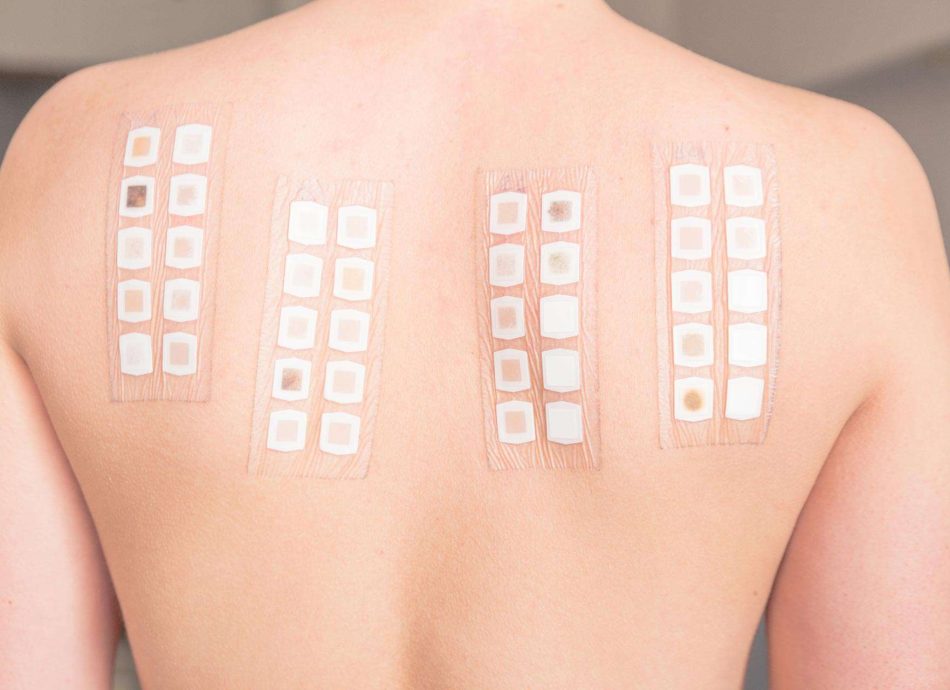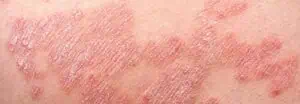Allergy Patch Test
Home » Treatments » Allergy Patch Test
Award winning dermatology service, with over 20 years of experience
Short waiting lists, on some occasions offering same week appointments
Safe environment, in Care Quality Commission approved facilities
Conditions
allergy patch testing at Stratum Dermatology Clinics
Our patch testing facility is a specialised unit designed to identify the sources of allergic contact reactions that may be causing your skin condition. In addition to patch testing, we offer comprehensive blood allergy testing to detect allergic components that may be triggering your skin issues. The substances used in these tests are commonly found in everyday products and can cause skin allergies. Typical allergens include metals, perfumes, rubber, glues and preservatives found in various toiletries. Please note that patch testing does not identify allergies related to diet, hay fever or asthma.
WHAT IS an ALLERGY PATCH TEST?
The purpose of patch testing is to determine if a contact allergy is causing your dermatitis or allergic reaction and to identify the specific substances responsible for your skin condition. The substances tested commonly exist in daily use products and can cause skin allergies. These include metals, perfumes, rubber, glues and preservatives typically found in toiletries. A patch test can screen for 20 to 70 allergens simultaneously.
The process needs three clinic visits over five or six days. If we identify allergens contributing to your skin condition, we will discuss the findings and advise on avoiding these allergens, hopefully leading to significant improvement in your skin condition.
1ST PATCH TEST VISIT
2ND PATCH TEST VISIT
3RD PATCH TEST VISIT
FREQUENTLY ASKED QUESTIONS
WHAT ARE THE “DOS AND DON’TS” DURING PATCH TESTING?
Accuracy in patch testing significantly relies on keeping patches dry. Water or moisture can result in allergens dissolving, complicating results interpretation.
While patches and ink markings are on your skin during the 4 to 5-day testing window:
Do’s:
- Carefully shower or sponge bath, keeping patches/markings clear from water
- Shower on the morning before your patch test (you won’t be able to have a proper shower for approximately 96 hours after)
- Enjoy a break from exercise or sweat-inducing sport
- If a patch loosens, try to tape it down yourself
- Reach out to the clinic if you have questions or concerns
Don’ts:
- Wet patches or markings while bathing or showering
- Engage in intense exercise resulting in sweat
- Go swimming
- Wear light or valuable clothing (as the ink may stain)
- Expose yourself to sunlight
- Take immunosuppressive medications (these suppress test results)
ARE THERE ANY SIDE EFFECTS OF PATCH TESTING?
- Reactions turning red, swelling or blistering
- Persistent reactions in strong positive allergies, which may last for a couple of weeks
- Eczema flare-ups due to positive patch test
- Pigmentation changes that can lighten or darken, often temporary
WHO SHOULDN'T OPT FOR PATCH TESTING?
Patch testing might not be suitable for you if you:
- Are pregnant or breastfeeding
- Have extensive eczema on your back
- Have been exposed to the sun or used a sun bed over the previous two weeks
- Have recently applied an artificial tan
- Are using moderate or high dose oral steroids
Additional point, skin conditions like sunburn or rash or excessive hair growth on your back can hinder successful patch application. Remember to shave the area before your appointment if you have excessive back hair.
Antihistamines can lower visible reactions to allergens, so avoid them 48 hours before and during the patch testing period.
REQUEST A CALL BACK
Please fill in this form and one of our team will give you a call back to arrange a consultation with one of our expert dermatologists.

HEAR FROM OUR PATIENTS
WHY GET YOUR ALLERGIES PATCH TESTED AT STRATUM DERMATOLOGY CLINICS?
ALLERGY PATCH TESTS CHELTENHAM
Stratum Clinics Cheltenham
5 Ormond Terrace
Cheltenham
GL50 1HR
ALLERGY PATCH TESTS OXFORD
Stratum Clinics Oxford
Cantay House
38-39 Park End Street
Oxford OX1 1JD
ALLERGY PATCH TESTS WIMBLEDON
Stratum Clinics Wimbledon & Raynes Park
Raynes Park Health Centre
1 Lambton Road
Wimbledon
SW20 0LW
latest INSIGHTS AND ADVICE

Guide to Fall Skin Conditions
Autumn, with all its stunning colours, also brings some challenges for our skin. As the air gets cooler and the leaves turn vibrant shades, it’s a reminder that we’re steadily approaching winter. Keeping your skin glowing and healthy during this transition from summer to the

Eczema Awareness Month – Complete Guide on Eczema
October is Eczema Awareness Month. For individuals living with eczema, you will be all too familiar with the trials of handling this skin complaint. It’s our mission throughout October and beyond to educate, support and empower you by delivering invaluable insights on its origin, available

Understanding Varicose Veins: Symptoms, Treatments and Prevention
Varicose Disease Awareness Month focuses on raising awareness about varicose veins, a common but often ignored condition affecting millions globally. This September, we’re highlighting the importance of early detection, available treatments and lifestyle changes to effectively manage varicose veins. By increasing awareness, we aim to